Faure Gnassingbé
Faure Essozimna Gnassingbé Eyadéma (French pronunciation: [foʁ ɲasɛ̃ɡbe]; born 6 June 1966[1]) is a Togolese politician who has been the president of Togo since 2005. Before assuming the presidency, he was appointed by his father, President Gnassingbé Eyadéma, as Minister of Equipment, Mines, Posts, and Telecommunications, serving from 2003 to 2005.
Faure Gnassingbé | |
|---|---|
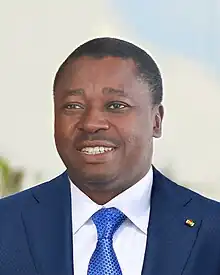 Gnassingbé in 2023 | |
| 4th President of Togo | |
| Assumed office 4 May 2005 | |
| Prime Minister | |
| Preceded by | Bonfoh Abass (Acting) |
| In office 5 February 2005 – 25 February 2005 | |
| Prime Minister | Koffi Sama |
| Preceded by | Gnassingbé Eyadéma |
| Succeeded by | Bonfoh Abass (Acting) |
| Personal details | |
| Born | 6 June 1966 Afagnan, Togo |
| Political party | UNIR (2012–present) RPT (1990–2012) |
| Spouse | Nana Ama Kufuor |
| Relations | Gnassingbé Eyadéma (father) Kpatcha (half-brother) |
| Alma mater | Paris Dauphine University George Washington (MBA) |
Following President Eyadéma's death in 2005, Gnassingbé was immediately installed as president with support from the army.[2] Doubts regarding the constitutional legitimacy of the succession led to heavy regional pressure being placed on Gnassingbé, and he subsequently resigned on 25 February. He then won a controversial presidential election on 24 April 2005, and was sworn in as president. Gnassingbé was re-elected for a second term in 2010.
In the April 2015 presidential election, Gnassingbé won a third term, defeating his main challenger, Jean-Pierre Fabre, by a margin of about 59% to 35%, according to official results.[3] In the February 2020 presidential elections, Gnassingbé won his fourth presidential term in office as the president of Togo.[4] According to the official result, he won with a margin of around 72% of the vote share.[5] This enabled him to defeat his closest challenger, the former prime minister Agbeyome Kodjo who had 18%.[5] The legitimacy of elections in Togo is widely disputed.
Background
Born in Afagnan in Lacs Prefecture where his mother gave birth to him at the Hospital of the Brothers of the Order of Saint-Jean-de-Dieu d'Afagnan,[1][6]Faure Essozimna Gnassingbé is of Kabye descent and is one of Gnassingbé Eyadéma's many children; his mother is Séna Sabine Mensah.[7] Gnassingbé received his secondary education in Lomé before studying in Paris at the Université Paris-Dauphine, where he received a degree in financial business management;[8] he subsequently obtained a Master of Business Administration degree from The George Washington University in the United States.[8][9] He was elected to the National Assembly of Togo in the October 2002 parliamentary election as a Deputy for Blitta, and in the National Assembly he was coordinator of the commission in charge of privatization. On July 29, 2003, he was appointed as Minister of Equipment, Mines, Posts, and Telecommunications,[8][10][11] serving in that position until becoming president in February 2005.[9]
Some in the opposition claimed that the amendment of the Constitution in December 2002, lowering the minimum age for the president from 45 years to 35 years, was intended to benefit Gnassingbé.[8] His appointment to the government in July 2003 came after he had already been appearing with his father at official functions[12] and contributed to speculation that he was intended as his father's successor.[8][12]
Presidency (2005-present)
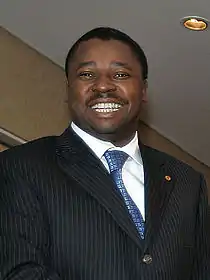
Eyadéma died suddenly on February 5, 2005. According to the Togolese Constitution, after the president's death, the president of the National Assembly should become acting president. At the time of Eyadéma's death, National Assembly President Fambaré Ouattara Natchaba was out of the country, and Gnassingbé was sworn in as acting president to "ensure stability". Many believe that Natchaba did not want to come back to Togo due to fears of assassination by the Gnassingbé clan. The army wanted him to resign his position and allow Gnassingbé to legally take over. The African Union denounced Gnassingbé's assumption of power as a military coup.
Legitimacy
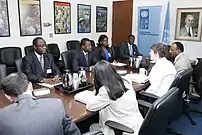
A day after his father's death, the National Assembly received clear instructions to dismiss Natchaba and elect Gnassingbé in his place, which would legalize his succession, which took place on 6 February 2005.[13] Gnassingbé's election was unanimously approved by the deputies (98% of them were members of the ruling party) who were present in the National Assembly at the time; the opposition was not represented in the National Assembly due to its boycott of the 2002 parliamentary election. The members of Gnassingbé's party did not want to challenge the army's choice. The parliament also eliminated a constitutional requirement that elections be held within 60 days of the president's death, enabling the younger Gnassingbé to rule until the expiration of his father's term in 2008.[14]
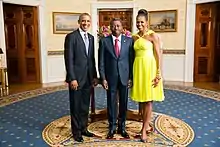
Under pressure from others in the region, and particularly Nigeria, later in February 2005 Gnassingbé announced that new elections would be held within 60 days, but said that he would remain in office in the meantime. However, on February 21, the National Assembly reversed some of the constitutional changes that it had made so as to allow Gnassingbé to assume power, although it did not instruct him to resign. This was construed as a way of pressuring him to stand down with dignity. To change the constitution during a period of transition was itself an unconstitutional act, but this did not deter Gnassingbé's allies.

On February 25, Gnassingbé was nominated by delegates of the ruling party, the Rally for the Togolese People, as the party's presidential candidate. He was also chosen as head of the party. Shortly afterwards, he announced that he would step down as president during the interim period. Bonfoh Abass was appointed by the National Assembly to replace him until the election on April 24, 2005. Bonfoh was considered by some to be a puppet of the military elite and the Gnassingbé family. Gnassingbé competed with the main opposition candidate, Emmanuel Bob-Akitani, a retired engineer of the state-owned mining company and the second most important person in the opposition coalition after Gilchrist Olympio. Olympio could not take part in the election, since the constitution required that any candidate must have lived for at least 12 months in Togo, and Olympio had been in self-imposed exile for fear that he would be murdered by the Eyadema clan like his father.
In the election, Gnassingbé received slightly more than 60% of the votes, according to official results. The RPT refused to allow oversight during the counting of the ballots. The EU and the Carter Center deemed the elections to be fraudulent. Mass protests by the coalition of opposition parties led to the killing of over 1,000 citizens by security forces.[15] 40,000 refugees fled to neighboring Benin and Ghana.[16]
Corruption
The phosphates sector – accounting for 40% of export revenues – is managed at the office of the president, and it is alleged that contracts and permits to manage the sector are sold to profit the president.[17]
Economic and fiscal policy
Ever since he took power in 2005 he has worked hard to push national reconciliation and make a peaceful political climate. While doing that he also advocated openness and has managed affairs. Under his administration Togo is recording noticeable growth increase and entered an active phase of modernization, thanks to bold policies. Gnassingbe has also done his best to improve the life of many people in Togo. While as president he has planned to attract, growth, and enhance investment.[18]
Since improving the Economy of Togo he has mobilized 12 to 860 billion CFA franc in order for construction of National No.2. He also reconstructed the nations infrastructure by progressing steps with the Togblécopé and Amakpapé bridges being completed. In which is why he had an agenda to develop the country in where he announced in Belgium.[19]
Gnassingbé agreed with Alpha Condé and Nana Akufo-Addo that he would successfully restore a national dialogue, enabling the ECOWAS to draw a plan to end the crisis. This plan proved to be successful as two years later, the country seems to have fully recovered, with its economy being more dynamic than ever.[20]
Reforms
After becoming president in 2005 he wanted to reform the nation to give his administration to clean up Public service. These reforms began with noted and many shortcomings. In which they would later set up workshops that decided on a framework for a global strategy for reform and the modernization of the public service. These reforms clearly provided for redefining and strengthening the capacities of the administration so that it can offer services witb quality of, rationalized structures and standards for better delivery at departmental level, it also strengthened the effectiveness of government work and promoted motivation for public servants.[21]
The process of reconciliation and democratization is not done for a single person. It is a collective work, it is a common good. We don't do it for the benefit of an individual, but we do it for the whole nation.
National Security
As the Islamic State was expanding in Africa Gnassingbé warned that though the national forces have won against them a few times, staying alert is a must, given the sporadic and unpredictable nature of the attacks. He also has relocated 12,000 Togolese in order to secure the nation’s borders but also welcoming refugees escaping from the Jihadists.[22]Under his rule he has continued to fight against Boko Haram.
Protests and term limit
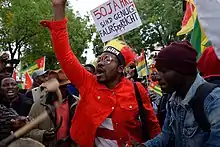
Since his dad Gnassingbé Eyadéma died in February 2005 there have been many protests which were caused by authoritarianism and elections which were claimed to be fraudulent. As these protests went on every year there would be more. With him even shutting down the internet admist the protests with the decision by the government to propose a constitutional change to bring about a two-term-limit of two which didn’t help the protestors.[23]
In 2019 the Parliament of Togo approved a new bill that allowed Gnassingbé to stay in office until 2030. Despite that many protests took place in the streets calling for the end of the dynasty ruling for 50+ years.[24]
Foreign relations
Since his first days in office Togo and China’s relations have been getting better with both countries economy also growing rapidly. With China developing its relations with Togo and will join efforts with Togo to push bilateral relations to new highs. The two countries have consolidated political mutual trust, enhance exchanges and cooperation and promote common development. China has encouraged and supported its enterprises to invest and develop in Togo since.[25]
He also met with Grand Master of the Sovereign Order of Malta in where they talked about humanitarianism and that Gnassingbé has improved it in his presidency.[26]
Meanwhile in 2010 Gnassingbé and the Prime Minister of Japan Yukio Hatoyama met with each other with Hatoyama congratulating Gnassingbé for winning the election results. Gnassingbé later met Fumio Kishida in the Japan-Togo summit meeting where Kishida expressed his support for Gnassingbé for visiting the funeral of Shinzo Abe. In response, President Gnassingbe conveyed his sincere condolences to former Prime Minister. They would also talk about their good relations with each other and how Japan was going to reinforce its relationship.[27]
See also
References
- "Biographie de nouveau président" Archived 2008-10-14 at the Wayback Machine, Radio Lome (in French).
- Osei, Anja (2018). "Like father, like son? Power and influence across two Gnassingbé presidencies in Togo". Democratization. 25 (8): 1460–1480. doi:10.1080/13510347.2018.1483916. S2CID 149724978. Archived from the original on 2022-06-26. Retrieved 2020-08-29.
- "Présidentielle 2015 : La CENI proclame les résultats provisoires - CENI TOGO". www.ceni-tg.org. Archived from the original on 2018-01-31. Retrieved 2015-05-03.
- "Togo's President Faure Gnassingbé wins fourth term". France 24. 2020-02-24. Archived from the original on 2020-02-24. Retrieved 2020-02-24.
- "Togo President Faure Gnassingbe wins fourth term in landslide". www.aljazeera.com. Archived from the original on 2020-02-24. Retrieved 2020-02-24.
- "Faure Gnassingbé : sa biographie, son parcours, sa vision". Faure Gnassingbe-Pour un Togo Fort et prospère (in French). Retrieved 2023-08-15.
- "Yamgnane recalé" Archived 2010-02-05 at the Wayback Machine, Republicoftogo.com, 2 February 2010 (in French).
- Ebow Godwin, "Has Eyadema Now Found a Successor?" Archived 2016-04-20 at the Wayback Machine, Ghanaian Chronicle, August 14, 2003.
- "Un homme de dialogue et d’ouverture" Archived 2007-12-13 at the Wayback Machine, Republicoftogo.com, March 19, 2007 (in French).
- List of governments of Togo, izf.net (in French).
- Monique Mas, "De la présidence Eyadéma à la dynastie Gnassingbé" Archived 2007-10-07 at the Wayback Machine, Radio France Internationale, February 7, 2005 (in French).
- "Togo: President appoints son as minister in new cabinet" Archived 2008-10-14 at the Wayback Machine, IRIN, July 30, 2003.
- Les Anciens Présidents de l'Assemblée Nationale - ..::Assemblée Nationale Togolaise::
- "Togo deputies legitimise 'coup'" Archived 2006-05-14 at the Wayback Machine, BBC News, February 7, 2005.
- 29 August 2005. Office of the United Nations High Commissioner for Human Rights (OHCHR). "Conclusions.""La mission d'établissement des faits chargée de faire la lumière sur les violences et les allégations de violations des droits de l'homme survenues au Togo avant, pendant et après l'élection présidentielle du 24 avril 2005" Archived 2005-12-17 at the Wayback Machine
- "Togo: 40,000 have now fled post-election instability". United Nations High Commissioner for Refugees. Archived from the original on 11 January 2018. Retrieved 10 January 2018.
- "Africa's political elites have built the same wealth plundering structures as the colonialists". QuartzAfrica. Archived from the original on 2020-08-11. Retrieved 2019-11-02.
- "Faure Gnassingbé". World Economic Forum. Retrieved 2023-08-15.
- "Notre Politique Mobilise les Bailleurs | Faure Gnassingbe". 2010-11-05. Archived from the original on 2010-11-05. Retrieved 2023-08-15.
{{cite web}}: CS1 maint: bot: original URL status unknown (link) - First, Togo. "Togo: Faure Gnassingbé hits the gas!". www.togofirst.com. Retrieved 2023-08-15.
- "Ninsao Gnofam : « Le Président tient à améliorer la qualité de vie des fonctionnaires » | Faure Gnassingbe". 2010-11-05. Archived from the original on 2010-11-05. Retrieved 2023-08-15.
{{cite web}}: CS1 maint: bot: original URL status unknown (link) - First, Togo. "Togo: President Gnassingbé announces upcoming revision of the national military programming law amid rising terrorism threat". www.togofirst.com. Retrieved 2023-08-15.
- "Togo Shuts Down Internet Access Amidst Protest Against President Faure Gnassingbé". koko.ng. 2017-09-07. Retrieved 2023-08-15.
- "Togo changes law to let president stand for two more terms". www.aljazeera.com. Retrieved 2023-08-16.
- "Xi Jinping Meets with President Faure Gnassingbe of Togo". www.fmprc.gov.cn. Retrieved 2023-08-16.
- "The Grand Master Receives the President of Togo Faure Essozimna Gnassingbe". Sovereign Order of Malta. Retrieved 2023-08-16.
- "Japan-Togo Summit Meeting". Ministry of Foreign Affairs of Japan. Retrieved 2023-08-16.